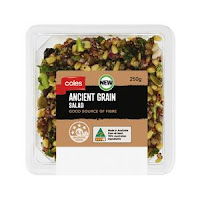Sorry for the delay in getting this information posted: Work for the International Courts and U.N. had to take priority yesterday.
However, I was not completely ignoring you all! I was checking out what is currently available in local supermarkets for people enjoying (or requiring) vegetarian and/or vegan foods. (I'll cover dealing with restricted diets later, although many matters similarly apply).
First off, these days there is always the option of buying frozen vegetarian or vegan foods which can generally be heated up in a microwave but there are a few issues to be considered if you do this.
1/ They often have large amounts of salt and/or additives included in their recipes. Check their ingredients list in case they include something you do not want to eat.
2/ Keep your food additive number lists handy so you can check what is involved and what you are actually purchasing, wherever you are in the world.
3/ Buying ready made meals can be great for an emergency or treat but are expensive and long-term, can hit your bottom line hard!
4/ It is a good idea to make sure you keep some foods (such as frozen) to be used as treats for when you start climbing the wall with boredom and might need a break from the same-'ol'-same-ol' menu!
The key is to know what your body needs and what you want to accept, at what level. Know your basic personal requirements; decide what you absolutely are not willing to eat and what you may be willing to compromise on. i.e. I once worked on a island where the only food available was frozen meat, one tomato and one lettuce. Make sure you get your protein levels daily (including keeping it complete), even if/when you have to use canned goods to supplement what you are choosing. i.e. canned lentils.
A good option is to check out the ready made meals sections at your supermarkets or convenience stores. There are far more options available as vegetarian and vegan requirements become more familiar to businesses both local and otherwise.
Depending on where you are working, check out what type of stores are wherever you are based.
Also consider your local delicatessens; use your walk workout or running to check out the local area and discover what is available.
In terms of sauces or condiments, always remember that you can use lemon juice, orange juice or vinegars on anything. i.e. malt vinegar.
Again, packaged rice is your friend, as are canned goods. Always pack a can opener somewhere in your luggage; don't assume there will be one where you are travelling to or that you will be able to buy one.
An additional source of product is hiking or camping stores.
In terms of take-out/take-away, consider what may be available in the local area regarding foods from other cultures or something you can put together yourself, in your hotel room or car.
Google is your friend under these circumstances! Don't dismiss possible sources of food such as local restaurants: Check out their menus in details. This restaurant in Oakland California, have the best Heuvos Rancheros I've ever eaten! 0:)
In brief, knowledge is power. And this is your chance to expand your palette as well as working out how dedicated you are to your choice of diet. Hint: Don't make yourself ill, remember you still have to be able to work at the end of your isolation. Be responsible to yourself and look after yourself. Know what you need and ensure you cover those needs, even if it takes more work than usual to do so.
Enjoy!
Ellen 0:)
Ellen F. Walker



No comments:
Post a Comment